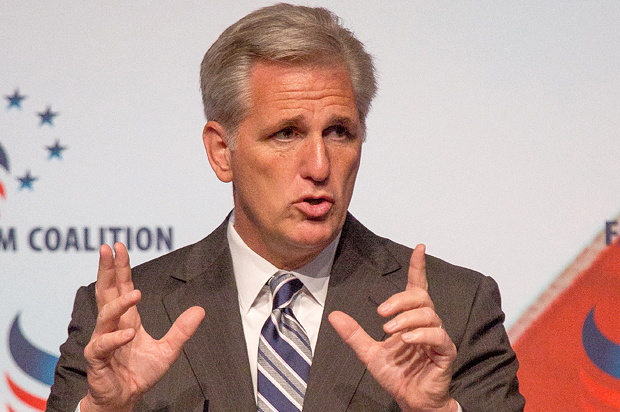Rep. Kevin McCarthy crushed the competition in last week’s election to see who would replace Eric Cantor as House majority leader. And, as one does when one makes waves in Republican politics, he went immediately to Fox News for his first post-election nationally televised interview. Finally, America would get to meet the man who slid into the government position most normal people often forget exists.
While plenty conservative in his own right, McCarthy fails the ever more stringent purity tests imposed by conservative activists who view his easy ascension as a slap in the face by the Republican establishment. Everyone assumed that since Cantor had been knocked off by a Tea Party-backed, Ayn Rand-obsessed economics professor, McCarthy would lurch to the right to help stave off some of the unrest his election caused. His Fox interview provided the first clues to his thinking, and revealed him to be the sort of cynical, short-sighted politician that we’ve come to expect in leadership roles within the major parties.
Fox’s Chris Wallace tried to get McCarthy to take a position on issues currently occupying the nation’s attention. And, for the most part, McCarthy declined. On Iraq, Wallace asked which of the terrible options available to us McCarthy supports, and McCarthy danced around it by insisting that we need a “strategy” (he said “strategy” eight times) without elaborating on what that should be.
On immigration, Wallace noted that he’d taken flak for supporting a path to legalization for undocumented immigrants, and McCarthy said: “I’m on record saying nothing about immigration, until we secure the borders. The borders are not secure.” Some are taking this amorphous “borders first” stance on immigration reform as a shift to the right, but McCarthy’s been saying some variation of this for a long time. “We must secure our borders as a first step in developing a long-term, realistic and enforceable solution,” his office told a local California news outlet in July 2013. He gave basically the same statement to Breitbart News in August 2013.
One area in which he did take an actual position – one that does indeed shift the party to the right – is on the Export-Import Bank. McCarthy was once a supporter of the bank, but in a sop to the party’s right flank, he now says he wants to let the bank’s charter expire later this year. “I think Ex-Im Bank is one that government does not have to be involved in. The private sector can do it,” McCarthy told Wallace.
The bank’s mission is to provide federally subsidized loans and loan guarantees to companies overseas so they can buy American-made products. Proponents of the bank – the National Association of Manufacturers, the Chamber of Commerce, etc. – say that it promotes economic growth. The bank itself says that between 2009 and 2012 it “helped to sustain nearly one million jobs across the country,” though the Government Accountability Office said their methodology for calculating this “has limitations.”
The bank divides Republicans and conservatives. It has long been a niche issue for libertarians who consider it corporate welfare, and hardcore limited-government types who dislike spending government money on anything that doesn’t explode. Big Business-aligned Republicans support the bank because they like getting money from Big Business.
Back in 2012, when Congress was debating whether to renew the bank’s charter, a small group of conservative lawmakers tried to convince the leadership to either let the bank die, or attach stringent reforms to it. The leadership member they tried to pitch on killing or strangling the bank was none other than Kevin McCarthy, and they were told in polite terms to go pound sand:
“We went to our leadership — in fact, conservatives in both the House and the Senate went to the leadership of both bodies and said, ‘Look, here’s some conservative reforms.’ And we were told very politely on both sides of the building, ‘Thanks, but we don’t need your votes,’ ” Rep. Mick Mulvaney (R-S.C.) lamented.
Mulvaney and others had been floating reform ideas to House Majority Whip Kevin McCarthy (R-Calif.), an aide explained.
McCarthy voted with Eric Cantor in favor of renewing the bank’s charter – a sin made especially grievous by the fact that supporting the bank meant cooperating with Obama and the Democrats.
Now that McCarthy is about to take Cantor’s seat and under fire from the right, he’s trying to throw conservatives a bone on the Export-Import Bank. And since Cantor was so effectively tarred as a “crony capitalist” by his Tea Party opponent, it makes sense for him to try to insulate himself from the same charge. He’s probably thinking that a well-timed flip-flop will take some of the heat off, now that conservatives are gearing up for a fight on this bugbear of theirs. Unfortunately for him, that’s not how conservatives work these days.
Even if McCarthy does succeed in killing the Export-Import Bank, he’ll still be a RINO. It might buy him a small measure of goodwill, but ultimately he’s just not conservative enough for a movement that is increasingly intolerant of ideological impurity. His anti-“conservative” rap sheet is a mile long even without the bank issue. Eric Cantor was accused of being pro-amnesty and he didn’t even pass a single reform bill. He tried to mollify his critics with hard-line anti-amnesty messaging, but it didn’t do him any good. The RINO stain can’t be washed clean.
By coming out in opposition to reauthorizing the bank’s charter, he’s making a cynical calculation that this policy shift will endear him to a base that has already learned to hate him. And that hatred will outlive the Export-Import Bank.

